Unit 8 It must belong to Carla. Section A (Grammar Focus~4c)课件(共20张PPT)
文档属性
| 名称 | Unit 8 It must belong to Carla. Section A (Grammar Focus~4c)课件(共20张PPT) |
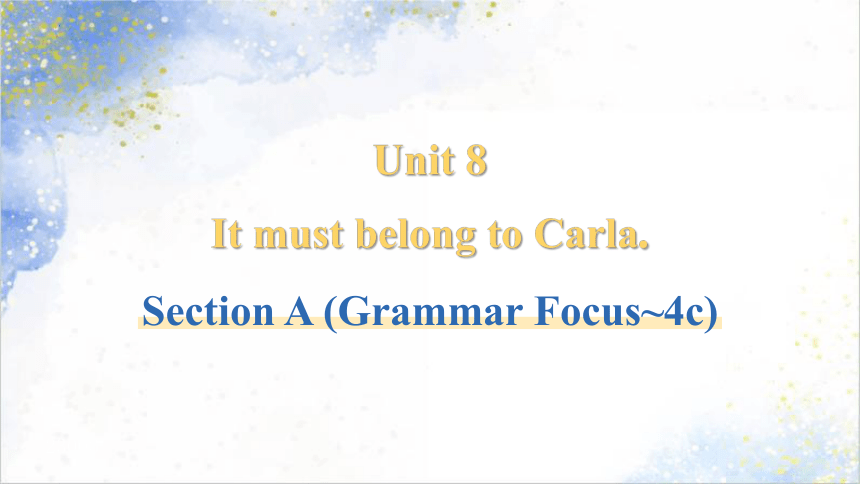
|
|
| 格式 | pptx | ||
| 文件大小 | 1.4MB | ||
| 资源类型 | 教案 | ||
| 版本资源 | 人教新目标(Go for it)版 | ||
| 科目 | 英语 | ||
| 更新时间 | 2024-12-15 00:00:00 | ||
图片预览

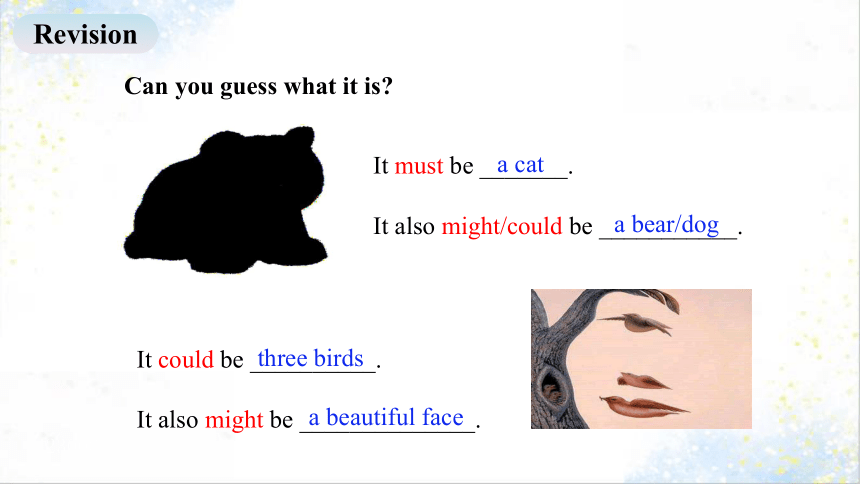
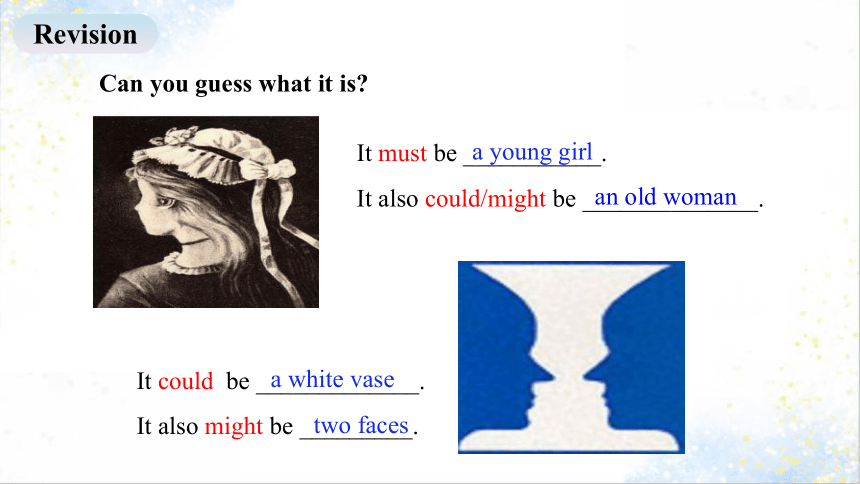
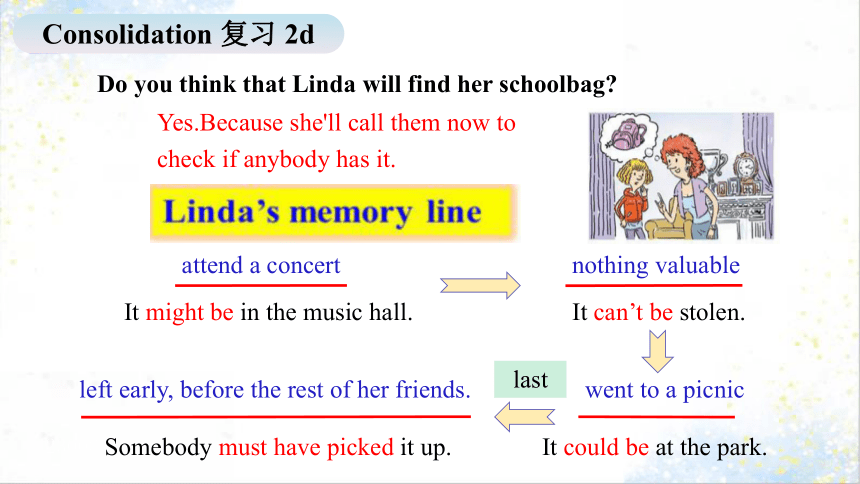
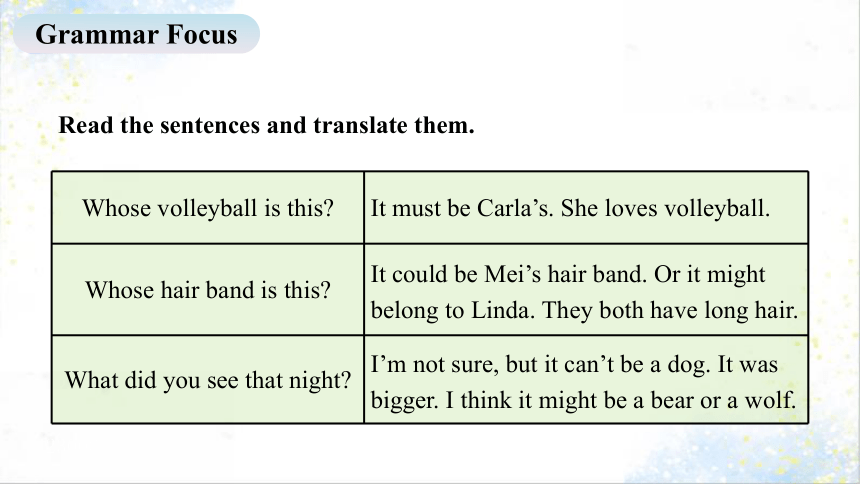
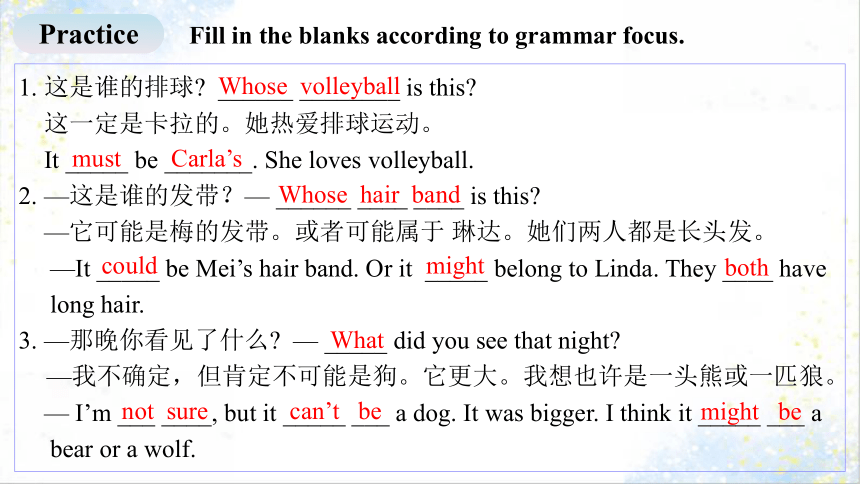
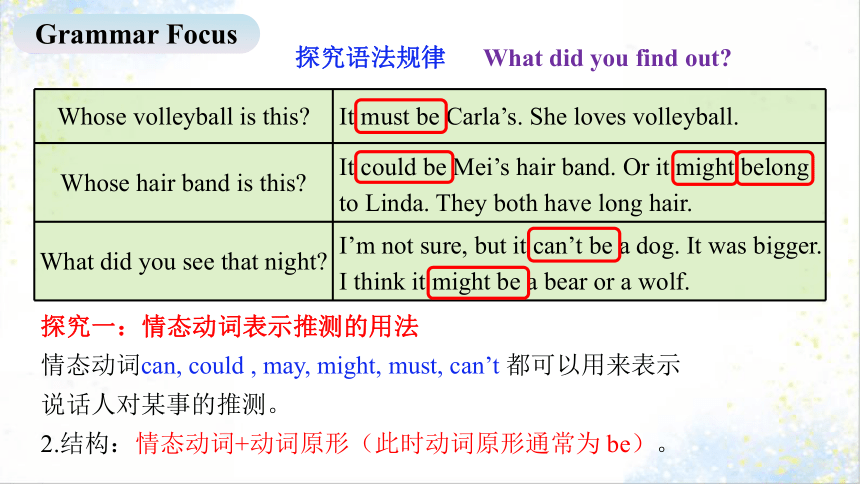
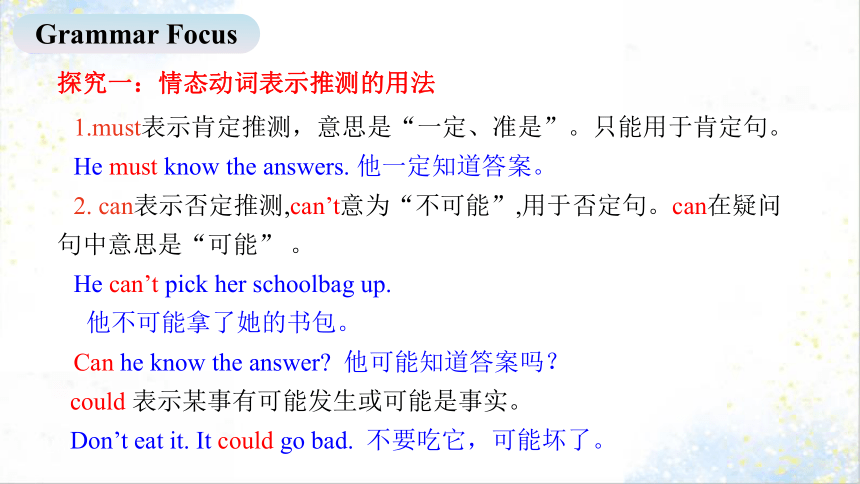
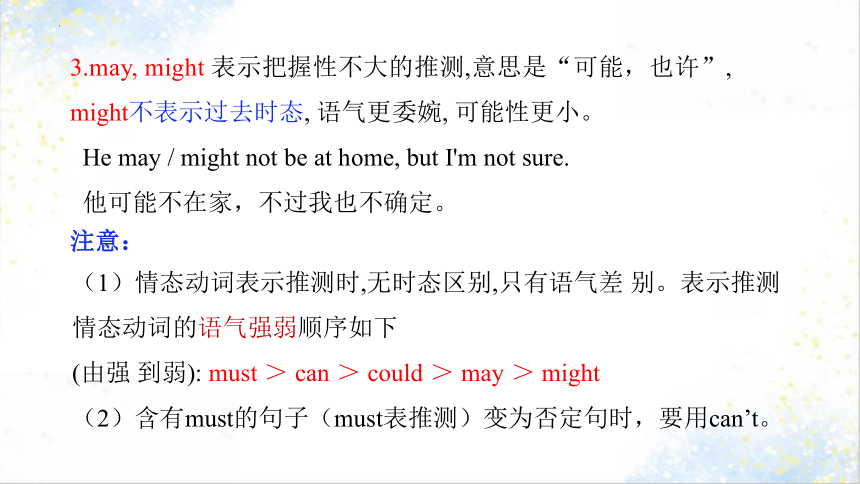
文档简介
(共20张PPT)
Unit 8
It must belong to Carla.
Section A (Grammar Focus~4c)
Can you guess what it is
It must be _______.
It also might/could be ___________.
a cat
a bear/dog
It could be __________.
It also might be ______________.
three birds
a beautiful face
Revision
It must be ___________.
It also could/might be ______________.
a young girl
an old woman
Can you guess what it is
It could be _____________.
It also might be _________.
a white vase
two faces
Revision
attend a concert
It might be in the music hall.
nothing valuable
It can’t be stolen.
went to a picnic
It could be at the park.
left early, before the rest of her friends.
Somebody must have picked it up.
last
Do you think that Linda will find her schoolbag
Yes.Because she'll call them now to check if anybody has it.
Consolidation 复习 2d
Whose volleyball is this It must be Carla’s. She loves volleyball.
Whose hair band is this It could be Mei’s hair band. Or it might belong to Linda. They both have long hair.
What did you see that night I’m not sure, but it can’t be a dog. It was bigger. I think it might be a bear or a wolf.
Read the sentences and translate them.
Grammar Focus
1. 这是谁的排球 ______ ________ is this
这一定是卡拉的。她热爱排球运动。
It _____ be _______. She loves volleyball.
2. —这是谁的发带?— ______ ____ ____ is this
—它可能是梅的发带。或者可能属于 琳达。她们两人都是长头发。
—It _____ be Mei’s hair band. Or it _____ belong to Linda. They ____ have long hair.
3. —那晚你看见了什么 — _____ did you see that night
—我不确定,但肯定不可能是狗。它更大。我想也许是一头熊或一匹狼。
— I’m ___ ____, but it _____ ___ a dog. It was bigger. I think it _____ ___ a bear or a wolf.
Whose volleyball
must Carla’s
Fill in the blanks according to grammar focus.
Whose hair band
could
might
both
What
not sure
can’t be
might be
Practice
Whose volleyball is this It must be Carla’s. She loves volleyball.
Whose hair band is this It could be Mei’s hair band. Or it might belong to Linda. They both have long hair.
What did you see that night I’m not sure, but it can’t be a dog. It was bigger. I think it might be a bear or a wolf.
探究语法规律
What did you find out
探究一:情态动词表示推测的用法
情态动词can, could , may, might, must, can’t 都可以用来表示说话人对某事的推测。
2.结构:情态动词+动词原形(此时动词原形通常为 be)。
Grammar Focus
1.must表示肯定推测,意思是“一定、准是”。只能用于肯定句。
He must know the answers. 他一定知道答案。
2. can表示否定推测,can’t意为“不可能”,用于否定句。can在疑问句中意思是“可能” 。
He can’t pick her schoolbag up.
他不可能拿了她的书包。
Can he know the answer 他可能知道答案吗?
could 表示某事有可能发生或可能是事实。
Don’t eat it. It could go bad. 不要吃它,可能坏了。
探究一:情态动词表示推测的用法
Grammar Focus
3.may, might 表示把握性不大的推测,意思是“可能,也许”, might不表示过去时态, 语气更委婉, 可能性更小。
He may / might not be at home, but I'm not sure.
他可能不在家,不过我也不确定。
(1)情态动词表示推测时,无时态区别,只有语气差 别。表示推测情态动词的语气强弱顺序如下
(由强 到弱): must > can > could > may > might
(2)含有must的句子(must表推测)变为否定句时,要用can’t。
注意:
注意:
can 表示推测通常不用于肯定句
may 表示推测通常不用于疑问句
must 表示推测通常不用于否定句和疑问句
can不肯,may不问,must 不否问
句式 情态动词 含义 用法
肯定句 must 一定 表示有把握的肯定推测。
may/ might/ could 也许; 可能 表示没有把握的肯定推测。
否定句 can’t/ couldn’t 不可能 表示有把握的否定推测。
may not/ might not 可能不 表示不太有把握的肯定推测。
疑问句 can/ could 可能 表示推测。
情态动词表示推测的意义和用法
情态动词表示推测可以分为以下几种情况:
★情态动词+ do 此结构表示对现在或将来情况的推测和判断
—Do you know where she is now
—I think she ______ ________in Beijing. 我认为她可能在北京旅游。
★情态动词+ be doing 此结构表示对现在或将来正在进行的情况的推测和判断。
At this moment, my father can’t be working in the office.
He ______ ______ ______ housework at home.他一定在家做家务劳动。
★情态动词+ have done 此结构表示对过去情况的推测和判断。
The road is wet. It ____________ _____ _____last night.昨天晚上可能下雨了
★情态动词+ have been doing此结构表示对过去正在进行的情况的推测和判断。 Your mother must have been looking for you at that moment.
探究二:情态动词表示推测的几种情况
must be doing
might travel
might/could have rained
Grammar Focus
1.belong to sb. 可用来指某物属于某人 , to是介词,后跟名词或代词的宾格形式等。
例: This book belongs to me.这本书是我的。
探究三:belong (to)的用法
2.“sth. belong(s) to sb.”也可以用“sth. +be +名词性物主代词或者名词的所有格形式”表示。
eg. -Whose T-shirt is this
-It must belong to Mary.同义句___________________
=It must be Mary’s.
The book belongs to her.同义句 ___________________
= The book is hers.
Grammar Focus
1. A: Where’s Jean
B: I’m not sure. She _________ (is / might be / must be) in the laboratory.
2. A: Everyone is going to the pool after school.
B: Really It _________ (must be / can’t be / could be) hot outdoors.
Choose the best way to complete each sentence using the words in the brackets.
might be
must be
n. 实验室
adv. 在户外,在野外
4a
3. A: That’s the phone.
B: Hmm. I wonder who it ________ (must be / could be / should be).
4. A: I wonder if these are Jim’s glasses.
B: They ________ (can’t be / might be / could be) his. He doesn’t wear glasses.
5. A: I hear water running in the bathroom.
B: It _________ (could be / must be / can’t be) Carla. She was thinking of taking a shower.
could be
can’t be
must be
3. A: This restaurant is always very crowded.
B: The food ________________.
4. A: Whenever I try to read this book, I feel sleepy.
B: It can’t ______________.
Complete these responses.
1. A: Many people are wearing coats.
B: The weather must be___________________________.
2. A: Sally has been coughing a lot.
B: She might be ____________________.
getting colder/ cold outside
having a sore throat / ill
n. 外套
must be delicious
be that boring
adj. 困倦的
4b
Look at this picture of a room. How much can you tell about the person who lives here Is it a boy or a girl What are his/her hobbies Discuss your ideas with a partner.
A: It could be a girl’s room because it’s very tidy.
B: I guess so. But it might be a boy’s room because the clothes look like boys’ clothes.
4c
I can see a girl in the picture. I think it must be a girl’s room.
I guess not. But it might be a boy’s room because in general boys like CD more than girls.
It could/might/can’t
be... because ...
I guess so/I don’t think so. But it might/could/must
be ...because …
Ask and answer in pairs.
Practice
Have a try
1.Bill看上去很累,昨晚他一定熬夜到很晚。
2.这本书不可能是我的。看!Jim’s名字在封面上。
3.那条粉红色发带可能是Linda的。
4.这辆玩具卡车可能不是我弟弟的。
5.书包里没有贵重的东西,所以它不可能被偷了。
Bill looks very tired, he must stay up late last night.
The book can’t be mine.Look! Jim’s name is on the cover.
The pink hair band might/could be Linda’s/belong to Linda.
The toy truck might/could/may not be my brother’s.
There is nothing valuable in the schoolbag,so it can’t be stolen.
当堂检测
情态动词表推测
主要有must, can /could, may /might等。
肯定推测:
must 表示把握性极强的肯定推测,意为“肯定、一定”;can / could和 may / might表示把握性不大的推测,意为“也许、可能”。
否定推测:
can’t 意为“不可能”,表示很有把握的否定推测,may not,might not意为“可能不”,表示把握性不太大的否定推测。
课堂总结
Unit 8
It must belong to Carla.
Section A (Grammar Focus~4c)
Can you guess what it is
It must be _______.
It also might/could be ___________.
a cat
a bear/dog
It could be __________.
It also might be ______________.
three birds
a beautiful face
Revision
It must be ___________.
It also could/might be ______________.
a young girl
an old woman
Can you guess what it is
It could be _____________.
It also might be _________.
a white vase
two faces
Revision
attend a concert
It might be in the music hall.
nothing valuable
It can’t be stolen.
went to a picnic
It could be at the park.
left early, before the rest of her friends.
Somebody must have picked it up.
last
Do you think that Linda will find her schoolbag
Yes.Because she'll call them now to check if anybody has it.
Consolidation 复习 2d
Whose volleyball is this It must be Carla’s. She loves volleyball.
Whose hair band is this It could be Mei’s hair band. Or it might belong to Linda. They both have long hair.
What did you see that night I’m not sure, but it can’t be a dog. It was bigger. I think it might be a bear or a wolf.
Read the sentences and translate them.
Grammar Focus
1. 这是谁的排球 ______ ________ is this
这一定是卡拉的。她热爱排球运动。
It _____ be _______. She loves volleyball.
2. —这是谁的发带?— ______ ____ ____ is this
—它可能是梅的发带。或者可能属于 琳达。她们两人都是长头发。
—It _____ be Mei’s hair band. Or it _____ belong to Linda. They ____ have long hair.
3. —那晚你看见了什么 — _____ did you see that night
—我不确定,但肯定不可能是狗。它更大。我想也许是一头熊或一匹狼。
— I’m ___ ____, but it _____ ___ a dog. It was bigger. I think it _____ ___ a bear or a wolf.
Whose volleyball
must Carla’s
Fill in the blanks according to grammar focus.
Whose hair band
could
might
both
What
not sure
can’t be
might be
Practice
Whose volleyball is this It must be Carla’s. She loves volleyball.
Whose hair band is this It could be Mei’s hair band. Or it might belong to Linda. They both have long hair.
What did you see that night I’m not sure, but it can’t be a dog. It was bigger. I think it might be a bear or a wolf.
探究语法规律
What did you find out
探究一:情态动词表示推测的用法
情态动词can, could , may, might, must, can’t 都可以用来表示说话人对某事的推测。
2.结构:情态动词+动词原形(此时动词原形通常为 be)。
Grammar Focus
1.must表示肯定推测,意思是“一定、准是”。只能用于肯定句。
He must know the answers. 他一定知道答案。
2. can表示否定推测,can’t意为“不可能”,用于否定句。can在疑问句中意思是“可能” 。
He can’t pick her schoolbag up.
他不可能拿了她的书包。
Can he know the answer 他可能知道答案吗?
could 表示某事有可能发生或可能是事实。
Don’t eat it. It could go bad. 不要吃它,可能坏了。
探究一:情态动词表示推测的用法
Grammar Focus
3.may, might 表示把握性不大的推测,意思是“可能,也许”, might不表示过去时态, 语气更委婉, 可能性更小。
He may / might not be at home, but I'm not sure.
他可能不在家,不过我也不确定。
(1)情态动词表示推测时,无时态区别,只有语气差 别。表示推测情态动词的语气强弱顺序如下
(由强 到弱): must > can > could > may > might
(2)含有must的句子(must表推测)变为否定句时,要用can’t。
注意:
注意:
can 表示推测通常不用于肯定句
may 表示推测通常不用于疑问句
must 表示推测通常不用于否定句和疑问句
can不肯,may不问,must 不否问
句式 情态动词 含义 用法
肯定句 must 一定 表示有把握的肯定推测。
may/ might/ could 也许; 可能 表示没有把握的肯定推测。
否定句 can’t/ couldn’t 不可能 表示有把握的否定推测。
may not/ might not 可能不 表示不太有把握的肯定推测。
疑问句 can/ could 可能 表示推测。
情态动词表示推测的意义和用法
情态动词表示推测可以分为以下几种情况:
★情态动词+ do 此结构表示对现在或将来情况的推测和判断
—Do you know where she is now
—I think she ______ ________in Beijing. 我认为她可能在北京旅游。
★情态动词+ be doing 此结构表示对现在或将来正在进行的情况的推测和判断。
At this moment, my father can’t be working in the office.
He ______ ______ ______ housework at home.他一定在家做家务劳动。
★情态动词+ have done 此结构表示对过去情况的推测和判断。
The road is wet. It ____________ _____ _____last night.昨天晚上可能下雨了
★情态动词+ have been doing此结构表示对过去正在进行的情况的推测和判断。 Your mother must have been looking for you at that moment.
探究二:情态动词表示推测的几种情况
must be doing
might travel
might/could have rained
Grammar Focus
1.belong to sb. 可用来指某物属于某人 , to是介词,后跟名词或代词的宾格形式等。
例: This book belongs to me.这本书是我的。
探究三:belong (to)的用法
2.“sth. belong(s) to sb.”也可以用“sth. +be +名词性物主代词或者名词的所有格形式”表示。
eg. -Whose T-shirt is this
-It must belong to Mary.同义句___________________
=It must be Mary’s.
The book belongs to her.同义句 ___________________
= The book is hers.
Grammar Focus
1. A: Where’s Jean
B: I’m not sure. She _________ (is / might be / must be) in the laboratory.
2. A: Everyone is going to the pool after school.
B: Really It _________ (must be / can’t be / could be) hot outdoors.
Choose the best way to complete each sentence using the words in the brackets.
might be
must be
n. 实验室
adv. 在户外,在野外
4a
3. A: That’s the phone.
B: Hmm. I wonder who it ________ (must be / could be / should be).
4. A: I wonder if these are Jim’s glasses.
B: They ________ (can’t be / might be / could be) his. He doesn’t wear glasses.
5. A: I hear water running in the bathroom.
B: It _________ (could be / must be / can’t be) Carla. She was thinking of taking a shower.
could be
can’t be
must be
3. A: This restaurant is always very crowded.
B: The food ________________.
4. A: Whenever I try to read this book, I feel sleepy.
B: It can’t ______________.
Complete these responses.
1. A: Many people are wearing coats.
B: The weather must be___________________________.
2. A: Sally has been coughing a lot.
B: She might be ____________________.
getting colder/ cold outside
having a sore throat / ill
n. 外套
must be delicious
be that boring
adj. 困倦的
4b
Look at this picture of a room. How much can you tell about the person who lives here Is it a boy or a girl What are his/her hobbies Discuss your ideas with a partner.
A: It could be a girl’s room because it’s very tidy.
B: I guess so. But it might be a boy’s room because the clothes look like boys’ clothes.
4c
I can see a girl in the picture. I think it must be a girl’s room.
I guess not. But it might be a boy’s room because in general boys like CD more than girls.
It could/might/can’t
be... because ...
I guess so/I don’t think so. But it might/could/must
be ...because …
Ask and answer in pairs.
Practice
Have a try
1.Bill看上去很累,昨晚他一定熬夜到很晚。
2.这本书不可能是我的。看!Jim’s名字在封面上。
3.那条粉红色发带可能是Linda的。
4.这辆玩具卡车可能不是我弟弟的。
5.书包里没有贵重的东西,所以它不可能被偷了。
Bill looks very tired, he must stay up late last night.
The book can’t be mine.Look! Jim’s name is on the cover.
The pink hair band might/could be Linda’s/belong to Linda.
The toy truck might/could/may not be my brother’s.
There is nothing valuable in the schoolbag,so it can’t be stolen.
当堂检测
情态动词表推测
主要有must, can /could, may /might等。
肯定推测:
must 表示把握性极强的肯定推测,意为“肯定、一定”;can / could和 may / might表示把握性不大的推测,意为“也许、可能”。
否定推测:
can’t 意为“不可能”,表示很有把握的否定推测,may not,might not意为“可能不”,表示把握性不太大的否定推测。
课堂总结
同课章节目录
- Unit 1 How can we become good learners.
- Section A
- Section B
- Unit 2 I think that mooncakes are delicious!
- Section A
- Section B
- Unit 3 Could you please tell me where the restroom
- Section A
- Section B
- Unit 4 I used to be afraid of the dark.
- Section A
- Section B
- Unit 5 What are the shirts made of?
- Section A
- Section B
- Review of Units 1-5
- Unit 6 When was it invented?
- Section A
- Section B
- Unit 7 Teenagers should be allowed to choose their
- Section A
- Section B
- Unit 8 It must belong to Carla.
- Section A
- Section B
- Unit 9 I like music that I can dance to.
- Section A
- Section B
- Unit 10 You're supposed to shake hands.
- Section A
- Section B
- Review of Units 6-10
- Unit 11 Sad movies make me cry.
- Section A
- Section B
- Unit 12 Life is full of the unexpected
- Section A
- Section B
- Unit 13 We're trying to save the earth!
- Section A
- Section B
- Unit 14 I remember meeting all of you in Grade 7.
- Section A
- Section B
- Review of Units 11-14
